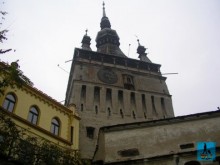Sighisoara City

Location:
Sighisoara is a city in Mures County situated in the central part of Romania, approximately in county’s south part, next to the border with Sibiu and Brasov Counties.
Area/Surface:
7.12 km²
Population:
27.000 people
Calling code:
+4 0265 or 0365
How to get here:
By car:
South-East entry: follow the European road E60 (DN13) from Constanța – Slobozia – Bucharest – Ploiești – Brașov.
North entry: follow the European road E60 (DN1/15) from France – Switzerland – Austria – Hungary – Oradea – Cluj Napoca – Câmpia Turzii – Luduș – Iernut – Târgu Mureş.
North-East entry: follow the National road DN13c – DN13a from Miercurea Ciuc – Odorheiu Secuiesc – Cristuru Secuiesc.
West entry: follow the National road DN14 from Sibiu-Mediaş.
By train:
Situated in the central part of Romania, Sighişoara Municipality compared with capital Târgu Mureş, is an important railway junction of the country. The main railway routes which cross the city are:
Satu Mare – Oradea – Cluj Napoca – Câmpia Turzii – Sighişoara – Braşov – Ploieşti – Bucharest
Baia Mare – Jibou – Dej – Războieni – Aiud – Mediaş – Sighişoara – Braşov – Ploieşti – Bucharest
Sighetu Marmaţiei – Beclean on Someş – Dej – Blaj – Mediaş – Sighişoara – Braşov – Ploieşti – Bucharest
Teiuş – Copşa Mică – Mediaş – Sighişoara and many others.
By plane:
Târgu Mureș City is the closest place of landing because it has a little International Airport, so tourists who want to come here by plain will have to land on “Transylvania” International Airport with daily flights from Budapest, Brcelona, Bucharest, Billund, Dortmund, London, Rome, Bologna, Milano, Madrid or Paris.
Foundation year:
1280 under Castrum Sex name.
When to go:
The best period to visit Sighişoara City is between March and April and between October and November. Try to avoid the winter months due to the lower temperatures and heavy rains and also the summer months when it might be too crowded because is the preferred season for tourists. Also in summer in the last weekend of July is held the annually Medieval Festival.
Sighisoara City
Name, importance and when to go in Sighisoara City:
Sighisoara City is one of the best known cities from Romania, known by Romanian people and also by foreign tourists, due to Dracula legend which goes around the city and of many places from Romania. It’s a small city, often named as The medieval pearl of Romania, with narrow cobbled streets and with old buildings from different centuries, meant to fascinate any tourist who’s a history lover. Sighisoara is also a very accessible city on any route, no matter from which part of the country you’re coming. If you want to avoid the crowd during summer, we recommend April-May or September-October when the weather is quite beautiful, but the number of the tourists is lower.
Location and tourist attractions and objectives from Sighisoara City:
The city is situated on a hill, known as the Citadel Hill, where long time ago was built Sighisoara’s Citadel and it is said that in modern times is the only lived citadel in all Europe. Here, between 1431 and 1436 lived also the well-known son of Mircea the Old (Mircea cel Batran), Vlad Dracul or Vlad Tepes, known by tourists as Dracula. Even if Sighisoara is a medieval city, the main point of visits is represented by Sighisoara Citadel and the historical center with its tourist attractions and objectives. Here, every year is hold the annual medieval festival named Medieval Sighisoara which every year surprise its visitors with different themes, games, quizzes and shows. Usually, this is held in the last week from July and brings tens of thousands of Romanian and foreign tourists in 2-3 days of festival.

Medieval Festival in Sighisoara City
Population and history:
After the Second World War, Sighisoara City had a population under 15.000 of people, from which more than a half were Germans or Sass from Transylvania. The maximum number of inhabitants was reached in 1992, recording 34.537 people. A few people know that Vlad Tepes was born here and also that in Sighisoara was created a replica of the Female Wolf Statue (Lupa Capitolina), the symbol of Latinity. (Find more journeys on blog.worldlifetimejourneys.com) The city was built by German (Saxons) traders in XIII century (named Schassburg) and the beautiful and well preserved historical center since 1999 is part of UNESCO World Cultural Heritage.
Unfortunately the history of Sighisoara City was not always happy because the city passed through many difficult periods. During XVII century, people had two difficult plague epidemics which halved the population in that time. After that in the same century, in 1676 it was a big fire which destroyed over three quarters from the city, followed by another two smaller fires in 1736 and 1788. If it wouldn’t be enough, in 1771 the city was hit by serious flooding even if it’s situated on a hill most of its parts and in 1838 was hit by an earthquake. However, Sighisoara was rebuilt several times and today delights its visitors with the beautiful tourist attractions and objectives. Visit Sighisoara City! You can find details about the most important attractions from this city by reading the article Sighişoara Tourist Objectives and Attractions.
 Old City seen from the Clock Tower, Sighisoara City
Old City seen from the Clock Tower, Sighisoara City
Sighisoara Tourist Objectives
Museums:
History Museum
Torture Room
Medieval Torture Objects Exhibition
Medieval Weapons Museum
Castles, citadels and old buildings:
Sighişoara Citadel:
The Clock Tower
Tanners Tower
Tailors Tower
Blacksmiths Tower
Furriers Tower
Shoemakers Tower
Butchers Tower
Ropes Tower
Tins Tower
Stag House
Venetian House
Vlad Dracul House
Churches and monasteries:
Dominican Monastery Church
The Church on the hill
Saint Joseph Romano-Catholic Cathedral
“Saint Trinity” Orthodox Cathedral
Lepers Church
Other tourist objectives and attractions:
The covered staircase
The School from the hill
The Lower Town:
Zilinschi House
Rosenthal House
Craftmen House
Hermann Oberth House
La Chip Tower







